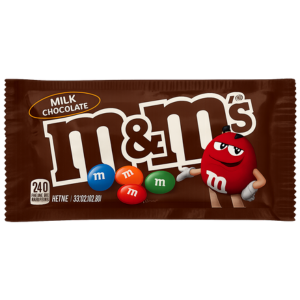
M&Ms
Caffeine
5–6 mg
Note: Caffeine amounts are based on the natural cocoa content in Milk Chocolate M&Ms and may vary slightly by batch.
| Attribute | Value |
|---|---|
| Caffeine Level | Low |
| Serving Size | 1 oz (28 g) |
| Caffeine | 5–6 mg |
| Calories | 140 kcal |
| Sugar | 18 g |
M&Ms are one of the world’s most recognizable chocolate candies, loved for their colorful candy shells and melt‑in‑your‑mouth chocolate centers. While they’re not typically thought of as a caffeine source, the milk chocolate in M&Ms naturally contains small amounts of caffeine.
What Are M&Ms?
M&Ms are bite‑sized chocolate candies produced by Mars, Incorporated since 1941. They come in a variety of flavors and fillings, from the classic milk chocolate to peanut, almond, crispy, and seasonal limited editions. Each candy features a thin, crunchy sugar shell stamped with the iconic “m” logo.
- Classic Milk Chocolate – The original variety with a smooth milk chocolate center.
- Peanut M&Ms – Whole peanuts coated in milk chocolate and a candy shell.
- Almond M&Ms – Almond centers with milk chocolate coating.
- Specialty Flavors – Includes caramel, pretzel, peanut butter, and seasonal releases.
- Limited Editions – Coffee‑inspired or dessert‑flavored varieties.
Their combination of portability, long shelf life, and variety has made M&Ms a global favorite for decades.
How Much Caffeine is in M&Ms?
The caffeine in M&Ms comes from the cocoa solids in the milk chocolate. While the amount is small, it can add up if you eat multiple servings.
- Milk Chocolate M&Ms – 5–6 mg caffeine per 1 oz (28 g) serving.
- Peanut M&Ms – 6 mg caffeine per serving (due to similar chocolate content).
- Almond M&Ms – 6 mg caffeine per serving.
- Pretzel M&Ms – 6 mg caffeine per serving.
- Coffee‑Flavored M&Ms – May contain slightly more caffeine, but still far less than coffee.
For comparison, an 8 fl oz cup of brewed coffee contains about 95 mg of caffeine — more than 15 times the amount in a serving of M&Ms.
Calories and Sugar
While caffeine is minimal, M&Ms are higher in sugar and calories, which is important for those monitoring daily intake.
- Milk Chocolate M&Ms (1.69 oz pack) – 240 kcal, 30 g sugar.
- Peanut M&Ms (1.74 oz pack) – 250 kcal, 25 g sugar.
- Almond M&Ms (1.74 oz pack) – 250 kcal, 24 g sugar.
- Pretzel M&Ms (1.14 oz pack) – 150 kcal, 17 g sugar.
- Peanut Butter M&Ms (1.63 oz pack) – 220 kcal, 20 g sugar.
These numbers show that while M&Ms are a fun treat, they’re best enjoyed in moderation if you’re watching sugar or calorie intake.
Ingredients Overview
The exact ingredients vary by variety, but all M&Ms share a core set of components.
- Milk Chocolate – Made from sugar, cocoa butter, chocolate, skim milk, milkfat, and soy lecithin.
- Sugar Shell – Sugar, cornstarch, coloring agents, and carnauba wax.
- Fillings – Peanuts, almonds, pretzels, caramel, or peanut butter depending on the variety.
- Flavor Additions – Natural and artificial flavors for specialty varieties.
This combination delivers the signature crunch, sweetness, and chocolate flavor M&Ms are known for.
Nutritional Facts at a Glance (Milk Chocolate M&Ms, 1 oz / 28 g)
A standard serving of Milk Chocolate M&Ms offers a small caffeine boost alongside its sweet, chocolatey taste.
- Calories – 140 kcal
- Total Fat – 5 g
- Sodium – 15 mg
- Total Carbohydrates – 21 g
- Sugars – 18 g
- Protein – 1 g
- Caffeine – 5–6 mg
- Caffeine per oz – 5–6 mg/oz
While the caffeine content is minimal, M&Ms can contribute to your daily total if combined with other chocolate or caffeinated foods.
